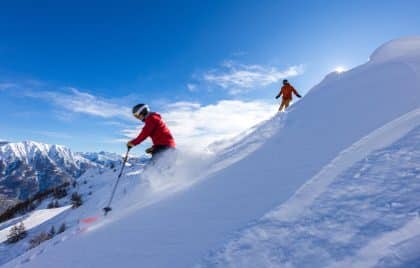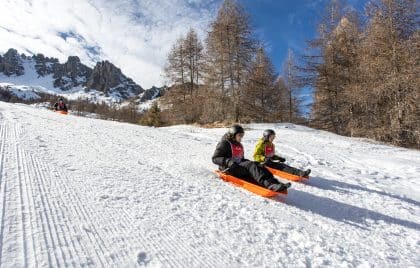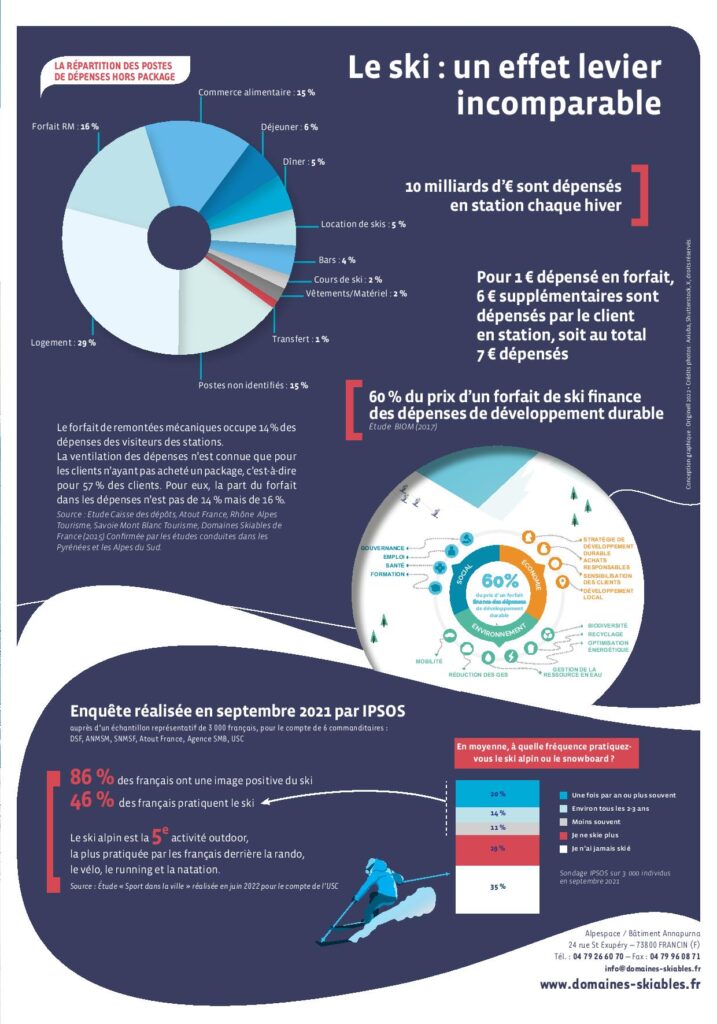REALLON COMMITTED TO RESPONSIBLE MOUNTAIN LIVING

Towards a controlled ecological shift
The Régie des remontées mécaniques de Réallon, which manages the Alpine and Nordic ski areas, is well aware of theclimatic challenges facing its business and of the meteorological trends that will certainly have a detrimental effect on the continuation of skiing in its areas.
Each of today's investment projects takes this into account in different ways: energy consumption or production, diversification of activities, integration into the natural environment, and is based on the hypothesis of a study by the SUD Region on local climate change. This study, carried out in partnership with Météo France and taking into account the IPCC's current worst-case scenario for global warming, points to a possible increase in snow difficulties and in the snow-related economy in 2050.
Réallon's objective is to ensure the resilience of its non-snow economy by 2040, giving this new model 10 years to mature and, if necessary, completely or partially detach itself from the ski product and secure its economic activity over the long term.
This structural objective for the future of the resort is reflected today in the investments financed by ski revenues (90% of current annual sales - the remaining 10% comes from summer revenues), which must support these developments.
These investment projects then lead to the implementation of energy production systems, optimization and reduction of consumption, awareness-raising and summer diversification.
-
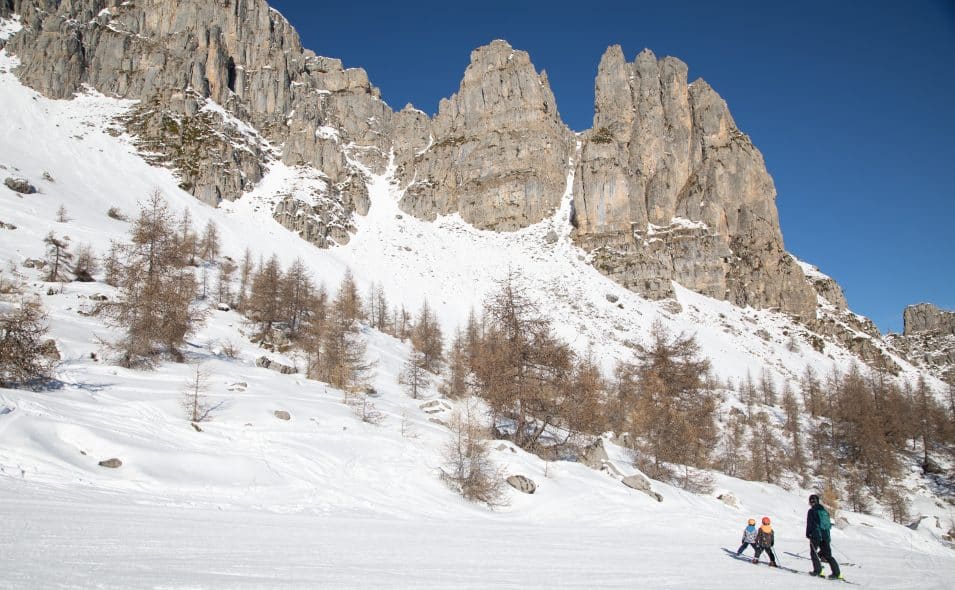 Find out more about Domaines Skiables de France's eco-commitments here
Find out more about Domaines Skiables de France's eco-commitments hereTargets to be achieved by 2030
- Achieve 30% of electricity generated in the ski area for its own needs
- 15% reduction in ski area energy consumption
- 15% reduction in energy consumption linked to snowmaking
- Involvement of all the resort's socio-professionals
- Green Snowflake 2023 certification
- Respect the eco-commitments of Domaines Skiables de France within 5 years
- Customer awareness and green resort image in questionnaire returns within 5 years
- Achieve 30% of electricity generated in the ski area for its own needs
-
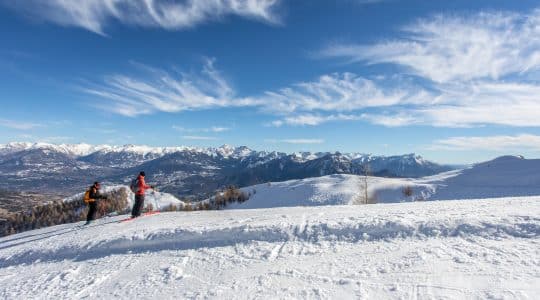
Protecting biodiversity and preserving landscapes
- Fauna and flora species inventory
- Awareness-raising campaigns and workshops with external contributors such as the Ecrins National Park.
- Re-vegetation of areas with local plants
- Avifauna facilities (bird protection)
Réallon will thus have a better understanding of the flora and fauna present in its territory, enabling it to plan its works in such a way as to limit disturbance to the various species.
Snow / skiing / infrastructure
- 100% green electricity contract
- Self-sufficient ski conveyor powered by photovoltaic gallery
- Limiting heating in buildings
- Renovation and insulation
- Reasoned public lighting (cut-off at night and according to the season)
-
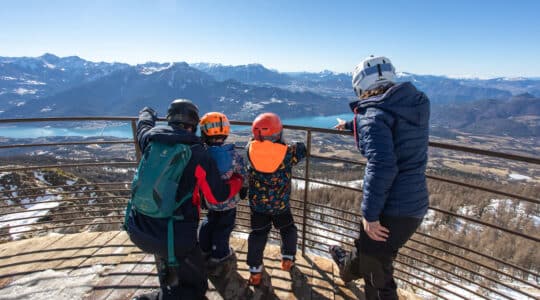
Waste reduction and awareness-raising
- Collective composting
- Serre-Ponçon community commitment: Territoire Zéro déchet Zéro Gaspi (TZDZG) (Zero waste, zero waste, zero waste)
- Waste reduction guide for retailers.
Design
- Optimization of all consumption
- In the event of earthworks, replanting with local plants
- Development of soft routes (non-motorized itineraries)
- Communauté de commune de Serre Ponçon commitment: Positive energy territories for green growth (TEPCV)
- Territory committed to ecological transition: carbon neutrality target 2030 (excluding transport: target 2050)
- Member via DSF of the Génération Montagne and Essentiem funds
-

Food-related actions
- Workshops on farms to help children discover how they work,
- restaurateurs committed to using local produce,
- activities at the Réallon school.
Actions linked to events
- Installation of water fountains,
- use of cardboard or ecocup crockery,
- give preference to local businesses and food (eco-responsible: food to develop the local economy),
- Ecological events charter
Transport
- Preventing skiers from carpooling or using public transport,
- a free shuttle service.
The alpine ski area improves its ecological impact
The carbon footprint of a ski holiday depends mainly on transport (60%) and accommodation (35%). Ski lifts and slope maintenance account for just 2%, but it's on this tiny portion - the only one that directly concerns lift operators - that Réallon and all French ski resorts wish to work.
On a national scale, 16 eco-commitments have been signed by Domaine Skiable de France, with the aim of becoming carbon neutral by 2037. Of the 2% generated by the ski area's activities, 95% is generated by grooming, so the emphasis will be on optimizing emissions from grooming equipment, with support for the manufacture of hydrogen-powered groomers. First of all, however, groomer drivers will be trained to use less diesel (saving 5 to 10%), as was done last spring by the Réallon groomers.
In the case of lifts powered by electricity, speed is reduced when there are fewer skiers, and some redundant lifts are closed outside the high season. On the Réallon lifts, this speed reduction is even automatic as soon as no one uses the lift since the 30-year overhaul of our equipment in 2019.
For snowmaking, the snow plan for 2020 and 2021 has enabled us to renovate snow guns and pumps to optimize electricity consumption in line with requirements, and also to produce more efficiently during cold spells. This optimization and the increase in instantaneous production power mean that less energy is consumed. It's also worth remembering that artificial snow is nothing more than a mixture of pressurized water and air.
Last but not least, the ski lift company is making choices on a daily basis to limit its impact: less plastic and more cardboard for animation supplies, signature of a new 100% green energy contract with EDSB l'agence (local electricity supplier), purchase of GNR GTL for its grooming machines (-30% CO2 and fine particle emissions), introduction of a free shuttle service to come from the valley. New investment projects include the installation of renewable energy production facilities and the monitoring and reduction of energy consumption. So, without denying the need to renew its business model in the coming years, the ski lift company is doing its best to limit its impact, while using the economic contribution of skiing as a springboard for reinvention.
Figures: The ski area has an annual CO2 emission of 158,950.76 Kg_CO2. In other words, 1.174 Kg_CO2/JSK per skier day. A day's skiing therefore represents 4 times fewer CO2 emissions than a round trip from Chorges to Réallon for a car with average emissions.
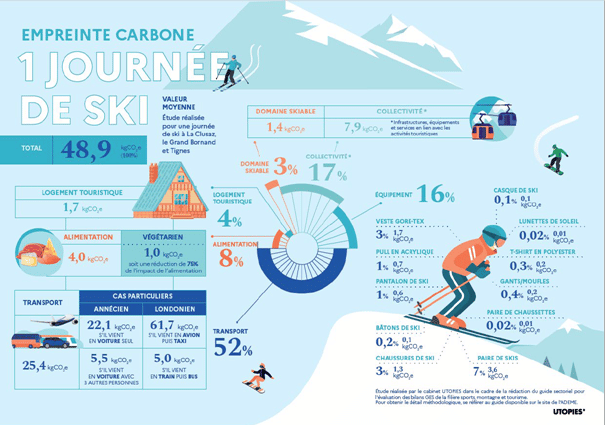
DETAILED ACTIONS
Eco-driving for climate and energy
One of the objectives set by the French ski resort is to be carbon neutral by 2037. The resort intends to " emit no more than one gram of CO2, well ahead of the COP21 targets ".
During the meeting, themajor impact of CO2 emissions from diesel-powered groomers (95% of emissions in ski resorts) was highlighted . On this point, it was suggested to develop hydrogen-powered groomers, as part of an eco-responsible energy transformation. In conjunction with manufacturers, DSF has indicated that " within 3 to 4 years, the first groomer prototypes could see the light of day ", a measure itself reinforced by the widespread adoption of eco-driving by its personnel.
Another aim will be to combat the "phantom ski resort" effect, by closing ski lifts that are not used at all, without actually closing pistes. The aim of this measure will be to combat energy wastage.
Responsible water management and agriculture
The idea behind these measures is to optimize water management, particularly in relation toagricultural activity.
It has been decided to favor water storage projects when there is an overabundance of water in the aquifers and, conversely, not to draw water when its flow is minimal. Another commitment will be to share stored water with livestock farmers, in particular to support pastoralism in the mountains.
In addition, all resorts with more than 6 snow groomers will now have to fit them with a GPS system to monitor the thickness of the snowpack and thus reduce the need for artificial snow. It is estimated that these measures could save 15% of resources.
The resorts have undertaken to limit the use of snow cannons by smoothing out their use over time and by storing water as soon as annual snow production requires more than 100,000 m3 of water.
Protecting biodiversity
Two major measures have been taken to protect biodiversity:
The first will be torequire each station to draw up an ecological inventory of their environment within 5 years (fauna, flora, wetlands, wintering areas, breeding grounds, etc.), so that they have a better understanding of the territory in which they are located. This last measure will serve as a reference guide for construction projects, which will then be able to limit the disturbance of certain species.
La deuxième sera d’agir pour la préservation des Tétras Lyre(Alpes) et Grands Tétras(Pyrénées) en signalant 100% des tronçons de câbles de remontées mécaniques dans lesquels ces oiseaux peuvent se blesser.
Landscape preservation
Another very important aspect of these measures is landscape preservation.
Pour agir concrètement, les domaines skiables français ont décidé d’opter pour 100 % de végétalisation après terrassement dans les zones herbeuses ou d’alpages ainsi que d’utiliser des semences endémiques dans ses travaux de revégétalisation.
Alexandre Maulin, president of the French ski area, also announced that three obsolete installations will be removed each year from 2023. The aim is to reduce the visual pollution from which many resorts suffer.
Waste reduction and awareness-raising
To combat waste pollution in the mountains, it has been decided that ski resorts, and not just associations, will organize a waste collection operation at least once a year.
En effet, rappelons que déjà plusieurs associations, comme celle de Mountain Riders, mènent déjà des actions depuis plusieurs années pour sensibiliser la population au développement durable en montagne. A plus grande échelle, beaucoup de stations sont engagées dans cette protection environnementale. C’est le cas du Val d’Allos qui propose un programme annuel pour le respect de la nature (journée nettoyage, week-end conférences, nuit étoilée, etc).
By way of illustration, up to 30,000 cigarette butts can be found under a 10-tower chairlift, and one cigarette butt pollutes 1 cubic meter of snow and 500 liters of water", according to DSF.
In addition, a general awareness campaign will be run for hikers and skiers in all ski resorts already partnered with associations.
What next?
The professionals have no intention of stopping there. These latest commitments are the beginning of a gradual change that will take shape over the next few years. On this point, Alexandre Maulin was assertive: " We know we'll go further (...) this is a first phase, and we'll be held to account ".
D’ici 2037, année fixée pour la neutralité en carbone en station, d’autres mesures pourront donc être votées afin de mettre en place une transition écologique plus que nécessaire pour la préservation de l’environnement en montagne.
